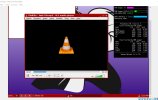are you talking to me or someone else in my thread?
To you. I can take an educated guess about a user's ability from the comments they make.
I guess that it isn't functional in the way that you prefer it to be?
I don't have a judgement about that. If you want to just replicate the functionality you're used to on Windows, there are ways to do that on FreeBSD. For example, VLC is actually available on Windows, Linux, and all the BSDs, with the exact same feature set. Actually, a lot of nice apps are. But when you have the hardware you have, it helps to know what the limitations of your specs are. As an example, Blender is no longer the little cool program that can run on 512 MB of RAM any more. It needs a beefy GPU that costs at least $500, and at least 32 GB of RAM to run well.
I wonder: when i say that i have been a Windows user since 1999 (2025-1999=26) do you interpret that as you know more than me? I know Windows well and i have been using virtualbox since version 4. If you have trouble configuring virtualbox and getting it to work in 4gb laptops, then maybe your opinion is based upon that fact. However, i have a full GUI Linux Mint with Firefox running while playing music. I have no problems other than it not running at full speed. I have also used Windows 10 in virtualbox on this system. You should read more about how to configure virtualbox and vboxmanage is a big help. Linux Mint with Cinnamon running Firefox and vlc is much heavier than FreeBSD with Xorg and a WM.
I've used Windows since 3.11 (back in 1994, then I watched my school install Windows 95, ), Linux between 2002 and 2017 (when I discovered Mandrake), FreeBSD since 2017. And
VirtualBox? It was released for the first time in 2007, I still had a Dell Inspiron laptop with 1 GB of RAM back then, and I still have my handwritten notes about Linux details from that time. And yeah, if you want anything remotely interesting to run inside a VirtualBox appliance at full speed these days, give that appliance at least 8 GB of RAM.
If you do any actual researh on these Forums looking for help with VirtualBox, you'll actually see a few of my posts where I give real help. I'm not gonna link to those posts, finding them is left as an exercise for you,
johnjohn ...
You should spend more time on Windows and hacking. Windows is a Playground for Hackers but then you do not know enough to understand it.
What in the world gives you the idea that you can be this rude to others on the Forums?

I can tell that
kpedersen knows quite a bit about Windows in the enterprise environments. We do have debates about the wisdom of some moves that we witnessed from the decision-makers in the enterprise environments, and we have our differences on what we see as Good Practices, but come on, that's because we can tell, "Hey, the other guy actually knows SOMETHING and has a point"...
Bill jumped that ship long time ago...
If you actually bother to read the Wikipedia entry about
Bill Gates, you'll discover that he was originally a Lisp programmer who understood the value of being open about letting others see the code and suggest improvements. In short, the guy himself actually understood Open Source pretty well.






